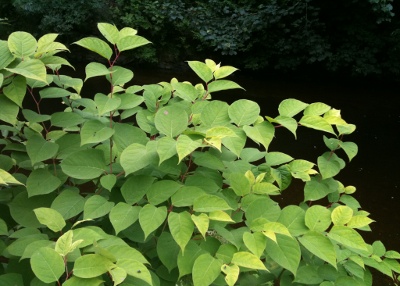Japanese knotweed has incredible pollution busting potential!
01-04-2015
Last updated 10-12-2021
 ***[UPDATE – April Fool! Did we catch you out?]*** Scientists at South Bedfordshire University in Dunstable have discovered the surprising ability of Japanese knotweed (Fallopia japonica) to gobble pollution from traffic when the weed is planted along busy urban road corridors. Knotweed’s incredible growth rate is powered by an exceptionally fast metabolism that utilises both the light and dark reactions of photosynthesis to absorb huge volumes of carbon from the atmosphere at an alarming rate. And the good news doesn’t stop there. As well as readily converting anthropogenic carbon, released from the combustion of fossil fuels in car engines, which the plants convert into useful biomass (that can be eaten, providing a highly nutritious food with health-boosting antioxidant properties!), they also absorb toxic oxides of nitrogen (NOX and NO2) and change them into nitrate compounds, which the plants then absorb as a kind of fertiliser through their extensive rhizome (root) systems. It might be too early in the research programme to start planting Japanese knotweed along some of our most polluted roads (like Oxford Street in London, which is the most polluted road in the UK, and possibly the world!) but this could be a real solution in some problem areas. The Environment Act 1995 requires all local authorities in the UK to declare Air Quality Management Areas (AQMAs) where legislated pollutant concentrations are exceeded. In such poor air quality ‘hotspots’, the offending authorities are then required to establish Air Quality Action Plans (AQAPs) with measures to seek to reduce the pollution to acceptable levels. Currently, many councils have failed to find cost-effective, or indeed practicable, methods to do this. If the enormous benefits of Japanese knotweed improving air quality can be harnessed, planting this invasive weed could provide a cheap and highly effective air pollution solution. South Beds Council is currently funding the work in Dunstable and is looking at a number of field sites to trial this innovative pollution-busting technique. Japanese knotweed may well prove not to be the pariah many would have us believe!
***[UPDATE – April Fool! Did we catch you out?]*** Scientists at South Bedfordshire University in Dunstable have discovered the surprising ability of Japanese knotweed (Fallopia japonica) to gobble pollution from traffic when the weed is planted along busy urban road corridors. Knotweed’s incredible growth rate is powered by an exceptionally fast metabolism that utilises both the light and dark reactions of photosynthesis to absorb huge volumes of carbon from the atmosphere at an alarming rate. And the good news doesn’t stop there. As well as readily converting anthropogenic carbon, released from the combustion of fossil fuels in car engines, which the plants convert into useful biomass (that can be eaten, providing a highly nutritious food with health-boosting antioxidant properties!), they also absorb toxic oxides of nitrogen (NOX and NO2) and change them into nitrate compounds, which the plants then absorb as a kind of fertiliser through their extensive rhizome (root) systems. It might be too early in the research programme to start planting Japanese knotweed along some of our most polluted roads (like Oxford Street in London, which is the most polluted road in the UK, and possibly the world!) but this could be a real solution in some problem areas. The Environment Act 1995 requires all local authorities in the UK to declare Air Quality Management Areas (AQMAs) where legislated pollutant concentrations are exceeded. In such poor air quality ‘hotspots’, the offending authorities are then required to establish Air Quality Action Plans (AQAPs) with measures to seek to reduce the pollution to acceptable levels. Currently, many councils have failed to find cost-effective, or indeed practicable, methods to do this. If the enormous benefits of Japanese knotweed improving air quality can be harnessed, planting this invasive weed could provide a cheap and highly effective air pollution solution. South Beds Council is currently funding the work in Dunstable and is looking at a number of field sites to trial this innovative pollution-busting technique. Japanese knotweed may well prove not to be the pariah many would have us believe!



